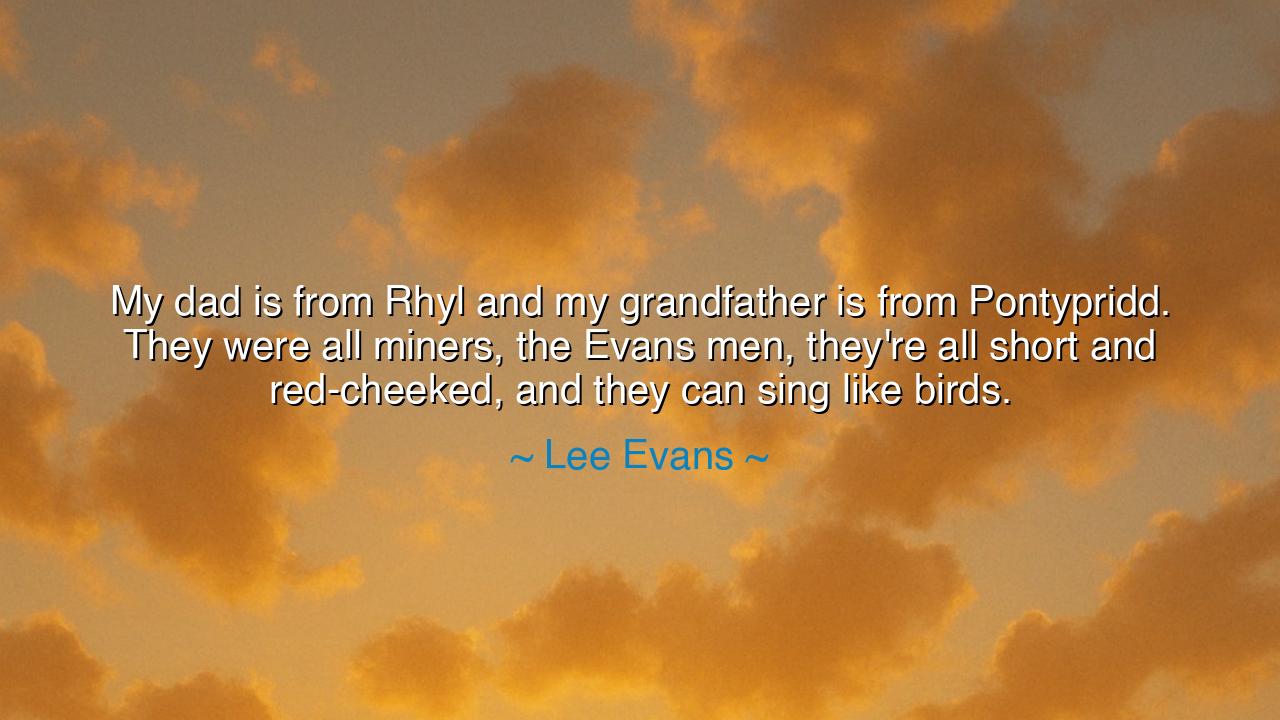
My dad is from Rhyl and my grandfather is from Pontypridd. They
My dad is from Rhyl and my grandfather is from Pontypridd. They were all miners, the Evans men, they're all short and red-cheeked, and they can sing like birds.






In a voice filled with warmth and remembrance, Lee Evans once said: “My dad is from Rhyl and my grandfather is from Pontypridd. They were all miners, the Evans men, they're all short and red-cheeked, and they can sing like birds.” To many, this might seem a simple reflection — a son speaking fondly of his lineage — yet to the wise ear, these words ring with the eternal melody of heritage, humility, and honor. In them lives the story of countless generations who labored in darkness yet carried light within them; men who dug through stone and coal not only to earn their bread but to forge the strength of spirit that would echo through their descendants.
For when Evans speaks of miners, he speaks of a sacred brotherhood — men who descended into the earth each day, faces blackened by dust, bodies worn by toil, yet hearts alive with music. They sang because singing was hope, and laughter was survival. These were the keepers of the flame beneath the mountains of Wales, the silent builders of a nation’s strength. Their songs rose from the depths, just as their souls did, unbroken and proud. To say they “can sing like birds” is no small phrase; it is poetry born of reverence — for even in the hardest labor, beauty found a voice.
The ancient philosophers would have called this nobility of labor — the truth that dignity lies not in the work’s glamour, but in the heart of the worker. The miners of Wales, like the farmers of Rome or the stonemasons of Egypt, were creators of civilization, though their names seldom graced the marble of monuments. They lived close to the earth, and the earth, in turn, shaped their souls: humble, enduring, radiant with quiet pride. Evans’ words remind us that greatness does not always roar; sometimes it hums softly in the tunnels beneath the world, carried on the breath of men who never gave up.
Think of Abraham Lincoln, whose father was a frontier farmer — uneducated, rough, and rooted in the soil. The son rose to lead a nation, but he never forgot his father’s calloused hands. From that humble beginning came the strength to bear the weight of history. So too in Evans’ lineage we see the same truth: the laughter of his comedy, the tenderness of his heart, the joy he brings to others — these are not accidents. They are inherited virtues, born from the courage and endurance of those who came before him. The Evans men, red-cheeked and stout, may have mined coal, but they also mined spirit, passing its gleam from father to son like a lantern through the dark.
There is a sacred beauty in his mention of song. In every culture, the working man has sung — the sailor’s shanty, the farmer’s tune, the soldier’s chant. Music transforms suffering into strength; it turns exhaustion into grace. The miners’ voices rising from the pit were a defiance against despair, a declaration that even in hardship, the soul remains unconquered. This is what Lee Evans remembers — not merely their trade, but their humanity, their refusal to let darkness silence their joy. Their songs, like the stars above their homeland, shone brightest when the night was deepest.
His words also remind us that we are the living echoes of those who came before. Our laughter, our courage, our creativity — they are all gifts of lineage, shaped by the labor, love, and sacrifice of our ancestors. To forget them is to lose ourselves; to remember them is to walk with strength. When Evans names his father and grandfather, he is not boasting of heritage — he is honoring it, offering gratitude for the soil from which he grew. Like the ancients who traced their ancestry to warriors or philosophers, he traces his to miners — and through them, to the indomitable spirit of the human heart.
Let this be the lesson, then: never despise humble beginnings. Whether your forebears were miners, farmers, weavers, or wanderers, carry their spirit with pride. Learn from their endurance, their simplicity, their song. Greatness is not only measured by titles or fame, but by the courage to endure with joy, to labor with love, and to keep one’s soul alive in the face of hardship. Let your life, like theirs, become a melody that uplifts others — proof that even those who dwell in the depths can create light.
For in the end, Evans’ words are more than memory; they are a hymn to ancestry. The miners of Rhyl and Pontypridd may no longer walk the earth, but their songs live on — in laughter, in art, in the unbreakable spirit of their descendants. So, to all who listen: honor your roots, sing your song, and remember — it is from the dust and sweat of those before you that the wings of your own greatness are shaped.






AAdministratorAdministrator
Welcome, honored guests. Please leave a comment, we will respond soon